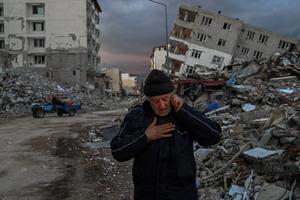After Devastating Earthquake in Turkey and Syria, Catholic Aid Agencies Mobilize to Help
In Syria, many cities and towns with a significant Christian population, such as Aleppo, Homs, Lattakia, and Hama, suffered major damage.

Catholic aid agencies worldwide are coordinating and sending aid after a series of massive earthquakes shook parts of Turkey and Syria, leaving continued devastation in their wake.
According to the latest available estimates as of midday Tuesday, the 7.8-magnitude quake has left at least 6,200 people dead in Turkey and Syria, the New York Times reported. In Syria, which has been ravaged by more than a decade of civil war, countless buildings collapsed Feb. 6, including several Catholic churches, reported ACI MENA, CNA’s Arabic-language partner agency.
Nikki Gamer, a spokesperson for the U.S.-based Catholic Relief Services, told CNA that CRS is supporting local church partners in Turkey and Syria, including Caritas Turkey and Caritas Syria, but coordination remains difficult. CRS is raising funds via a banner on its website.
“Many of our partner staff are personally affected by the destruction,” Gamer told CNA.
“Telecommunications are disrupted and transportation is impaired, complicating relief efforts and attempts to identify and account for family members. Snow, sleet, and freezing temperatures are in the forecast, so priority needs include safe shelter, warm clothes, and hot meals. Our partners have begun to offer that support and will continue to assess and address the needs in the weeks to come.”
The Catholic humanitarian organization Aid to the Church in Need (ACN) is readying an emergency aid program, spokesman Joop Koopman told CNA. Their current focus is on the provision of blankets, milk for infants, and medical supplies, he said. In addition, engineers are inspecting houses making sure families can safely return to their homes, while many shelter in churches and church buildings.
“We will have more information in the next couple of days,” Koopman told CNA.
In Syria, many cities and towns with a significant Christian population, such as Aleppo, Homs, Lattakia, and Hama, suffered major damage. In Aleppo, several UNESCO World Heritage sites were damaged, including the citadel of the old city.
Witnesses to the tragedy said the earthquake and its aftermath were, though brief, just as traumatic as the war.
“If you ask the people of Aleppo about the war they lived through, they express their feelings of pain, fear, despair about the future, loss of safety, etc. They use many different expressions to express the 12-year war. But if you ask them about the earthquake that they were exposed to, the answer is just one word: horror,” Sister Annie Demerjian, a Catholic religious sister who lives and works in the city, told Aid to the Church in Need.
Chaldean Catholic Bishop Antoine Audo said they are hosting at least 50 people at the bishopry, while Bishop Ephraim Maalouli, the Greek Orthodox metropolitan bishop of Aleppo, Alexandretta, and their Dependencies, said they had already sheltered nearly 1,600 people at various churches in the city since the disaster.
Other Catholic groups are responding mightily to the many people in need. The Franciscans in Aleppo are currently hosting and feeding some 2,000 people at their convent, according to Father Massimo Fusarelli, minister general for the Order of Friars Minor.
Among those killed in Aleppo was Father Imad Daher, a priest of the Greek Melkite Catholic Parish of Our Lady. Daher died when the residence of the former archbishop of Aleppo, Jean-Clément Jeanbart, collapsed. Archbishop Jeanbart narrowly escaped and is currently being treated for his wounds in a hospital, though he is said to be stable, ACN said in a statement Monday. Another Christian man who was in the building at the time also died, the organization said.
- Keywords:
- turkey
- aleppo, syria
















